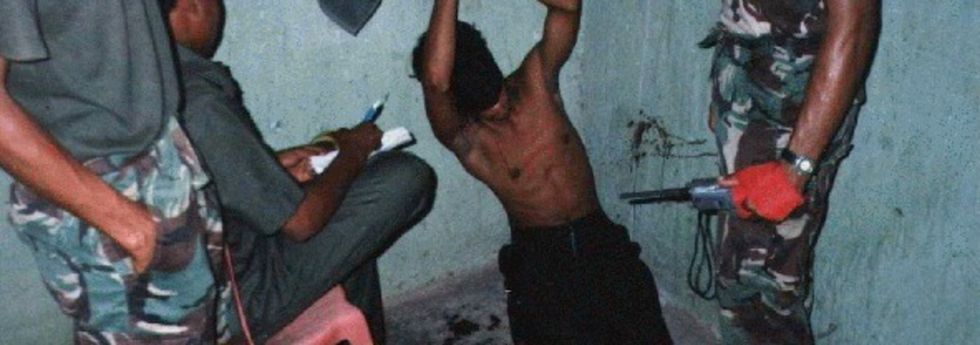Of the 21st century totalitarianisms--the Hussein, Jong-Un and Asad dictatorships to name the most brutal--their use of torture and fear is accurately described as “systemic.” However, while institutionalized and routine, the violence moreover is capricious, it is random and unpredictable. Not only is this literally true within the prisons and holding cells of the security apparatus, but this idea is manifest in society itself. The Mukhabarat see and know all, and they will ensure that everyone knows this.No one is safe. The very air one breathes is pungent with fear. If you chant the propaganda, if you praise Hafez and Bashar, if you denounce all “foreign sponsored terrorists” there is yet a chance you will live out the rest of your life in a dank, claustrophobic cell. This is because violence has not merely transformed from the means into the ends. Violence has remained a tool, while becoming an ideology.
Hannah Arendt wrote that the concentration camp is the vindication of totalitarianism: the complete subjugation and transformation of the human being.
Totalitarianism is never content to rule by external means, namely, through the state and a machinery of violence; thanks to its peculiar ideology and the role assigned to it in this apparatus of coercion, totalitarianism has discovered a means of dominating and terrorizing human beings from within.
Torture, starvation, dehydration--these are the order of the day in the Asads’ prisons. As chattel, the detainee knows that at any moment death, or worse, is only footsteps away. A glimpse into this hell is offered by those who have survived it. I needlessly say that all who enjoy the luxury of a free society owe it to the bearers of tyranny to, for a moment, step into their shoes. Through detainees’ testimonies, along with satellite imagery, Amnesty International has constructed a horrifying virtual tour of the notorious Saydnaya prison.
Inmates--who have committed treasons ranging from owning a song offensive to the regime, to participation in protests--are driven to the prison in what detainees have termed the “meat fridge”. The prisoners-to-be are terrified and confused; trembling, they ask each other what awaits them. One former inmate recalls a security officer solemnly raising his head, whispering, “You are going to Saydnaya, God help you.”
Upon arrival, the truck is stopped and the prisoners wait in silence for a period of time. Anxiety is let to foment. After ten excruciating minutes, guards slowly swarm the truck, cursing at the prisoners. The doors are flung open and each guard picks out a detainee to bludgeon. Christened by blood, every aspect of the detainee’s lives now become in tandem with the mood of their guards. Their whole being will be gradualized into a living prison.
Immediately the inmates are handcuffed and blindfolded. Soon after, they are stripped naked and their hair buzzed. After more beatings from whips and cables to pipes and batons, detainees are stuffed in small, cramped cells. Inmates have to take turns standing up and sitting down. Everything is designed to regiment the individual--guards no longer need to be present to compartmentalize every second of life. “Everything is an order.”
The physical torture--beatings, rape, stress positions, burning, electrocution--does not sufficiently achieve the goal of the prison. If torture is confined to security officers' execution onto prisoners, an “us and them” is made clear, moral high ground may even be gained. Guilt must be distributed wholesale. Totalitarianism corners the individual and convolutes all conceptions of accountability or reason.
We were requested by jailers to kill each other. Sometimes the wardens came with a knife or a rope, and they asked prisoners whether they had relatives or friends in prison. And once they identified their friends and relatives, they gave them one of two options: either killing their relatives or being killed themselves. And in many cases, being killed themselves included also being tortured before being killed.
Because of our situation – we look very bad, and we smell bad – so the guards wouldn’t usually make any sexual advances on us. But still, there was one time that the guard stripped all of us. And he chose two of us, one of us huge, and the other very small.
He told the two to come to him. He asked them to turn in a circle, to show him their bodies. Then he ordered the bigger one to rape the smaller one. Because of the torture, and the situation, he couldn’t, even if he had tried. The guard told him he had to do it or he would die.
This is something that goes a bit beyond Hannah Arendt’s conception of the concentration camp, which stretches apart the individual so that he becomes one with the mass, completely ripped apart from his agency. In the unique environment of the prison, one’s individuality remains, albeit tattered and broken. This detail is used by the guard as a tool for the detainee’s own torture. By keeping him away, unwatched, in the cell, his is allowed to have and own thoughts. By allowing him to interact with other inmates, a sense of self vis a vis another prisoners; human bonds are built and maintained. The flicker of hope the prisons permit is used to scorch the prisoner. Once a friend is made, a name is remembered, the guard orders the prisoner to kill those he cares about, violate those he holds dear. In this too, totalitarianism is made real.
At the foundation of the prison’s logic was one particular thing: deprivation. You are forced to keep shut your eyes, you are told to keep quiet or else the guards will come.“Silence is the master.” A story told by former detainees provides an important exposition in the various tactics of totalitarianism.
For three days water was kept from the prisoners. After the third day a small bowl was given to every cell to share, roughly nine people in each. When water spilt onto the ground it was of course licked up. Then, another three days went by without water. The prisoners recall hallucinations, “every time I closed my eyes I saw waterfalls.” One detainee remembered that his friend Ahmad confessed that if water did not come he would drink from the toilet gutter; the detainee asked him why he was ashamed, if nothing comes, so would everyone else. Finally, an inmate found the courage to cry out “water!” This was echoed by another, and then another and another. Water! Water! Water! Water! Water! The prison was in a frenzied chant. A dropping sound pierced through the air and all went quiet. At first it was thought to be a hallucination, until the cell spigots spurt out liquid. The detainees characterized the feeling as indescribable, the cells erupted in weeping and laughter.
The prisoners were conditioned to stay quiet to avoid torture--this was the reason water was not asked for, and was accepted in an incredibly meager quantity. The purpose of the restriction of water was clear. The prisoners will allow themselves to be starved of water. The prison transforms the inmate into a pavlov’s dog; he's come to act upon the idea that finding agency means torture, but then nevertheless are forced by the guards to do so. In essence, this episode was made to deprive the prisoners of reason or sense, to shake any idea they had of predictability-- life is subject to randomity, and therefore is meaningless.
In Saydnaya, we didn't know anything. We're just sitting there waiting for punishment, always living as if this is the last five seconds of your life. You don't do anything because you're kept in a room, and you don't know when you're going to be killed because the prison wardens were telling us that we would be hung anytime soon.
The sole purpose of Saydnaya, “punishment” in fact serves the regime more than any other type of prison. What it provides for the dictatorship far surpasses any signed confession or rebel location obtained through torture. It is the deliverance of the ideology. Ms. Arendt wrote that the totalitarian thesis is as follows: everything is possible. This must be understood apart from a utilitarian understanding of tyranny, perhaps in a system where everything is permitted to attain security, wealth or information. Regimes like that of the Asads take a leap further; they seek the evacuation of the human psyche and the evisceration of his personality to create a new kind of man. Neither an animal nor a person, the new human being is a raw product of depravity and is constantly in a state of malleability. The terror, violence and conformity realized in the cells and torture rooms of the prisons inevitably leak into society, informing its regimentation.
The pornography of power and control is something that resembles a sort of cartoonish portrayal of evil, found in story-book villains. Destruction for destruction’s sake, power for power’s sake. Something as infantile as this cannot be imagined in reality, which is why the conditions of Nazi concentration camps, the Soviet gulags and the Baathist prisons create a person that is both completely surreal and utterly primitive. Moreover, when an individual escapes he will--although traumatized and changed--return as a "regular" member of society. The camps and prisons can sustain this psychotic state only under constant and unrelenting duress--a fact which speaks to the strength of humanity and the malevolence of totalitarianism.
For reasons that should be obvious, this kind of societal organization and oppression is not desirable, nor morally acceptable. This, I think, is clear to anyone who has the unfortunate experience of glancing at a picture from the infamous Caesar files or the film of the liberated concentration camps. What is also plain, but rarely recognized, is that this is a system which is inherently unstable. Clinical obsession with sadism, control and authority, and the result being the destruction of all that is human, carries with it the seeds of its own destruction. This is an evil so great, it will consume itself; it will simultaneously destroy the society it hopes to dominate--a version of this is being executed in Syria as we speak, manifest in the obliteration of entire neighborhoods and towns. One might infer that if this is the case, nothing obligates “us” to intervene and dismantle totalitarianism. Not so. It means only that every act of torture and murder is completely excessive. Each atrocity provides no semblance of stability. Slaughter will accomplish nothing other than the immediate gratification of the guard, and the brief easing of the ruling elites' panic and paranoia. This fact demands of us more expedient and effective action against the Syrian regime for the express reason of destroying it and bringing justice to its victims.

















